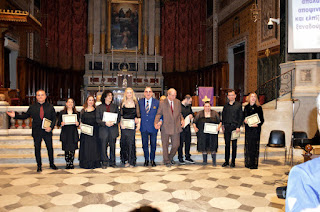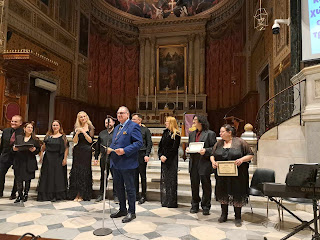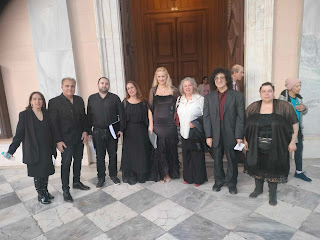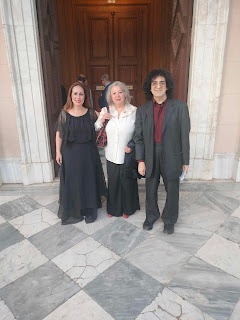
THE BEST OF AMERICA.-
EMBCA’s “2ND HELLENIC/ GREEK REMBETIKA , AND TURKISH MUSIC CONCERT “ yesterday evening in Association with the Turkish American Chamber of Commerce & Industry /TACCI at St. Peter’s Church at Citicorp Center exceeded all expectations and was nothing short of a HIGHLY SUCCESSFUL, SPECTACULAR and AMAZING EVENT !! The Concert in an elegant and great venue featured the finest music with Greek/ Hellenic Rembetika Ensemble headed by Julie Ziavras its Musical/ Artistic Director , and the Turkish Ensemble- Strings of the East headed by its Musical /Artistic Director Cengiz Onural. Many heartfilled thanks to the highly culturally and ethnically diverse American audience and your humbling extremely positive comments. A SHOUT OUT to my Greater Harlem Chamber of Commerce colleagues, my development, design and construction associates and the American School of Classical Studies in Athens, among many groups for being there in what was really an international American event. You more than helped create another EMBCA SIGNIFICANT, FANTASTIC & UNIQUE EAST MEDITERRANEAN MUSICAL CULTURAL EXPERIENCE EVENT !! My introduction to the Hellenic Rembetika Ensemble:
“Tonight you will hear Hellenic Rembetika music, often referred to as the "blues of Greece," encapsulates a rich tapestry of cultural influences, reflecting the struggles, joys, and spirit of the Hellenic people. Originating in the late 19th/ early 20th century, Rembetika emerged from the urban working-class neighborhoods, particularly in port cities like Piraeus, Thessaloniki, Smyrna, Port Said, and New York. At its core, Rembetika embodies the ethos of laïkó music, characterized by its raw emotions and poetic lyrics. The themes often revolve around love, loss, poverty, and life's hardships, mirroring the realities of everyday existence. Instrumentally, Rembetika is distinguished by its use of the bouzouki, a stringed instrument with a distinct sound that evokes both melancholy and celebration. One of the defining features of Rembetika is its subversive nature. Initially associated with marginalized communities such as sailors, refugees, and urban outcasts, Rembetika was frowned upon by the mainstream society and even banned at times due to its perceived association with crime and rebellion. However, its popularity continued to grow, fueled by its authenticity and resonance with the common people.Despite its humble origins, Rembetika underwent a process of cultural evolution, drawing influences from various musical traditions such as Byzantine, Ottoman, and Sephardic Jewish music. This fusion of styles resulted in a unique musical genre that transcended geographical and cultural boundaries, capturing the imagination of audiences both within Greece and abroad. Over the years, Rembetika has undergone periods of revival and reinvention, maintaining its relevance in contemporary Hellenic music. Its enduring legacy can be heard in modern interpretations by artists who pay homage to its roots while infusing it with new sounds and perspectives.In essence, Hellenic Rembetika music serves as a testament to the resilience and creativity of the Hellenic people, preserving their cultural heritage and providing a voice for the marginalized and disenfranchised. Through its evocative melodies and poignant lyrics, Rembetika continues to inspire and captivate audiences, ensuring its place in the musical landscape for generations to come. Enjoy. “
















































































.jpg)


.jpg)

























